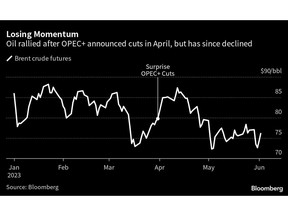Saudis Shoulder Burden of Stabilizing Oil Market With Extra Cuts

[ad_1]
Today News ||
Saudi Arabia said it will make an extra 1 million barrel-a-day production cut in July, taking its production to the lowest level for several years after a plunge in crude prices.

Article content
(Bloomberg) — Saudi Arabia said it will make an extra 1 million barrel-a-day production cut in July, taking its production to the lowest level for several years after a plunge in crude prices.
Advertisement 2
Article content
Speaking after an OPEC+ meeting in which other producers offered no additional action to buttress current oil prices, but did extend their existing cuts into 2024, Saudi Energy Minister Prince Abdulaziz bin Salman said the kingdom “will do whatever is necessary to bring stability to this market.”
Article content
The kingdom is doubling down on production cuts after the previous round of curbs — agreed just two months ago — failed to deliver a sustained price rally. The Organization of Petroleum Exporting Countries and its allies announced a surprise supply reduction of about 1.6 million barrels a day in early April, but since then weak economic data from China and recession fears have weighed on oil futures, which fell 11% in New York in May.
Article content
Advertisement 3
Article content
Next month’s additional cut could be extended, but the Saudis will keep the market “in suspense” about whether this will happen, Prince Abdulaziz said. The minister has repeatedly sought to catch bearish oil speculators off guard, warning them to “watch out” in the buildup to Sunday’s meeting.
“For the near term, crude prices will largely depend on a test of wills,” said Bob McNally, president of consultant Rapidan Energy Group and a former White House official. It will be a battle “between stability-seeking Saudi Arabia and bearish paper traders.”
The additional cuts announced on Sunday will bring Saudi production to about 9 million barrels a day in July, the lowest since June 2021 when output was still recovering from the depths of the Covid-19 pandemic.
Advertisement 4
Article content
The main winner from the weekend’s OPEC+ talks was the United Arab Emirates, which gets a boost to its production limit for next year at the expense of some African members who were asked to give up part of their unused quotas. Energy Minister Suhail Al Mazrouei thanked his colleagues for the increase and expressed the country’s loyalty to the cartel.
“We will always support OPEC and will always stay together,” he said. It was an important statement from a country that has previously toyed with the idea of leaving OPEC, on at least one occasion threatening to leave the group if it didn’t get a higher quota.
Russia, the second largest OPEC+ producer, wasn’t required to make any additional cuts this year, but like other members it extended its existing curbs by a year to the end of 2024. Moscow has increasingly been competing with its Gulf OPEC allies in Asian markets since Europe banned most imports of its oil. There have also been questions about whether it has fully implemented its pledged production cuts in recent months due to high volumes of exports.
Advertisement 5
Article content
The announcement of the OPEC+ deal was delayed by several hours as ministers haggled over the details. The most contentious point was the revision to the baselines against which the production cuts of several nations are measured. African nations Angola and Nigeria, which have struggled to meet their output targets almost since they were introduced three years ago, were the strongest holdouts, delegates said.
Even though the countries can’t fully utilize their output quotas today, they were unwilling to give them up, delegates said. Several of them are seeking new investments to boost production in coming years and a restrictive OPEC+ output quota could undermine their attractiveness to foreign investors.
It was a bitter political pill for them to swallow and talks dragged on through late night sessions in Vienna hotels on Saturday to a prolonged set of negotiations in the OPEC headquarters on Sunday. In the end, the impasse was resolved and the African countries agreed to lower output limits, subject to an independent review of their production capacities.
More Economy Business News Updates of Today Check Below
Today News || Business Today || World News || Headlines Today || Health || Technology News || Education News
Source



Comments
Postmedia is committed to maintaining a lively but civil forum for discussion and encourage all readers to share their views on our articles. Comments may take up to an hour for moderation before appearing on the site. We ask you to keep your comments relevant and respectful. We have enabled email notifications—you will now receive an email if you receive a reply to your comment, there is an update to a comment thread you follow or if a user you follow comments. Visit our Community Guidelines for more information and details on how to adjust your email settings.
Join the Conversation